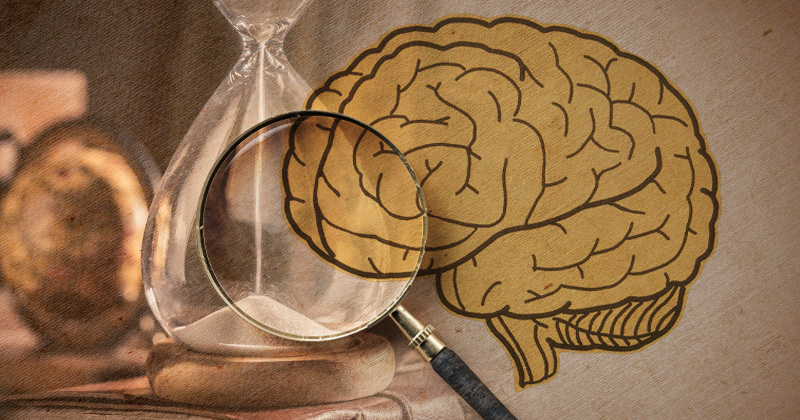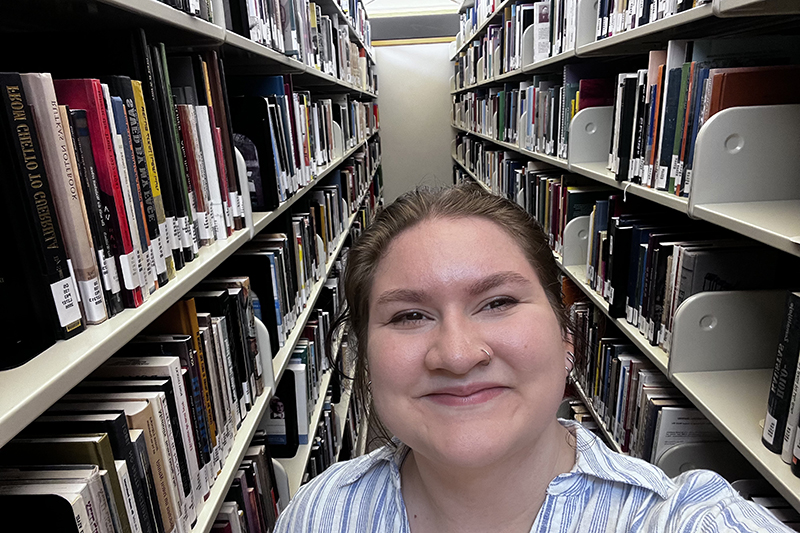


Understanding history’s long-term impact
Photo illustration by Jaynell Keely | Photo courtesy of Heaven Boisclair October 02, 2025
Student research explores the impact of childhood trauma on future generations
University of Delaware senior Heaven Boisclair started at UD with a neuroscience major and planned to minor in history to pursue her personal interest in the field. By sophomore year, she realized she could major in both subjects, expanding her knowledge in both areas.
Boisclair was selected as a 2025 Raymond Callahan Experiential Learning Fund scholar, and this summer she combined her interests into a self-directed research experience studying the psychological impact of genocide, specifically the Holocaust, on children.
In June, she visited the archives of the United States Holocaust Memorial Museum, where she reviewed survivor testimonies. Her initial goal was to build on existing research that shows people who experience childhood trauma can be more susceptible to PTSD or schizophrenia in adulthood by qualitatively making connections between children’s experiences during the Holocaust and these neuroscientific implications.
UDaily spoke to Boisclair about how she merged her interests in neuroscience and history, and how she coped with researching such a sobering subject.
Q: Tell us more about how neuroscience and history overlap. Why are you drawing on both for your research?
Boisclair: I’ve always just loved history, but I also enjoy neuroscience. There is actually a lot of overlap between them. Neuroscience is technically a new area of study, and there are so many things that have happened in history that we can look back on and can view through the lens of neuroscience now. Looking at history with that perspective can really help us understand the lasting impact and secondary traumatization of something like a genocide.
People don’t always realize how interwoven the sciences and humanities are, but it would be difficult to conduct research without considering the human element.
Q: Can you give an example of how you applied your neuroscience background to something you found in the archives?
Boisclair: I watched the personal testimony videos of a woman named Halina Kleiner. She was about 10 when the Nazis invaded Poland, and she was liberated at age 16.
Kleiner’s oral history described how she was constantly in fear. She was seeing so many traumatizing things — people being deported, people dying.
From what I know based on current research in neuroscience, living in a state of constant fear, especially during formative years, Halina was in a position to experience a severely dysregulated nervous system for a prolonged period of time during her adolescent years, and that would set the stage for PTSD, and possibly paranoia, and depression.
It isn’t possible to test her now, but a dysregulated nervous system can also lead to epigenetic effects, which can leave chemical marks on your DNA that could be passed down to generations.

Q: Did you find anything unexpected in your research?
Boisclair: I discovered existing research on how the Holocaust survivors’ trauma impacted future generations that I wasn’t aware of before. This research showed some survivors who had children after liberation were severely emotionally detached to their children, and were not truly empathetic or loving to their children, and could not meet a lot of their children's emotional needs.
The research also found that female children of survivors could develop eating disorders, possibly because of the insecure attachment styles with their parents, and then also the need to fulfill their parents' ideas of perfectionism.
Other survivors were able to develop close relationships with their families, of course, and research on transgenerational trauma is still developing, but after finding this, I decided that it made sense to expand my own work to include children of survivors.
Q: This is a difficult topic to study. What was the personal impact on you and how did you deal with it?
Boisclair: I’m not going to downplay that it is very hard to study genocide. It’s an emotional process, and it hurts a lot to learn these stories, but it is so important. I made time to take breaks and step away for a while, but the stories behind the Holocaust, or the Armeinan genocide or Cambodia need to be communicated.
It can be extremely saddening and shocking, even traumatizing, but I was able to push through that emotional response because I know that it is so important to learn these stories, and to communicate these stories to keep these people and these stories alive.
In the end they were people and not just numbers, not just photos in a museum. They were mothers, fathers, daughters, and they had stories that they should have been able to tell themselves. We need to tell those stories for them.
Q: What is the impact of the project?
Boisclair: This wasn’t a traditional internship; it is more self-directed research, and there is so much that we don’t know about the long-term impact of trauma, but I was able to add to my understanding of the research on neuroscience and the impact of childhood trauma.
Personally, looking at the stories of these survivors, both from a human perspective and also a research perspective, was really integral for me, because I went into this honestly, thinking “what am I doing here? I don’t have a degree. I can’t do this.”
But then, being able to make the connections and understand what things mean, I realized I can do this. I can make a retrospective diagnosis and add to our knowledge. It was really inspiring for me.
Contact Us
Have a UDaily story idea?
Contact us at ocm@udel.edu
Members of the press
Contact us at mediarelations@udel.edu or visit the Media Relations website

